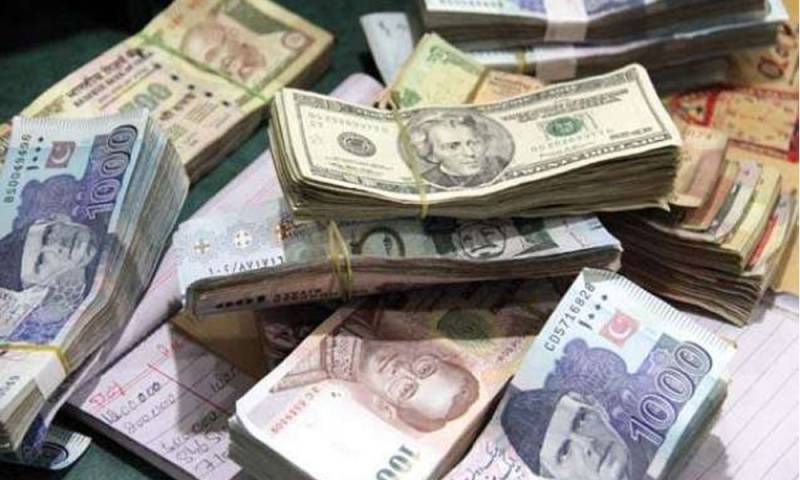
Senior economists at the International Monetary Fund (IMF) have warned countries against relying too heavily on monetary policy easing, and argued that currencies are “neither the hammer nor the nail” in efforts to reinvigorate economies, reported CNBC.
This warning comes as Pakistan is among those who opted for devaluation, resulting in a crisis with multidimensional negative ramifications, ranging from alarming inflation to shrinking economic activity due to higher cost of doing business.
It is worth noting that people like Ishaq Dar have stressing that devaluation would have destructive consequences for Pakistan.
Meanwhile, CNBC reported that IMF senior economists Gita Gopinath, Luis Cubeddu and Gustavo Adler in a blog warned that the recent surge in monetary easing from both advanced and emerging market economies has created concerns over so-called “beggar-thy-neighbour” policies and fears of a currency war.
Beggar-thy-neighbour refers to international trade policy which aids the country which enacted it while harming its neighbours or trade partners.
While monetary easing can help stimulate domestic demand, in turn benefiting other countries by increasing demand for their goods, the IMF expressed concern about its weakening of exchange rates. This makes exports more competitive and reduces demand for other countries’ imports as their prices increase, an effect known as “expenditure switching.”
Currency devaluation has become a focal point for global trade tensions. Earlier this month, the US formally accused China of currency manipulation, while in June, President Donald Trump attacked ECB [European Central Bank] President Mario Draghi for the impact of his dovish comments on the value of the euro against the dollar.
“With conventional monetary space limited for some advanced economies, this currency channel of monetary easing has received considerable attention,” the IMF note said.
“But one should not put too much stock in the view that easing monetary policy can weaken a country’s currency enough to bring a lasting improvement in its trade balance through expenditure switching.”
Monetary policy alone is unlikely to induce the “large and persistent devaluations” required to achieve that lasting improvement, the post concluded, highlighting that the expenditure switching impact of a currency weakening is generally minimal.
A 10 per cent depreciation on average improves a country’s trade balance by around 0.3 per cent of gross domestic product (GDP) within a 12-month period, primarily through contracting imports, the note highlighted, since trade is largely invoiced in dollars.
Over a three-year time span, this increases to a 1.2 per cent of GDP improvement in trade balance as exports respond more meaningfully to exchange rate movements, though the “full expenditure switching effect remains relatively modest,” it added.
The IMF report also took aim at what it deemed counterproductive policy options taken by policymakers to mitigate currency overvaluation, such as imposing tariffs on imports from countries perceived to have undervalued currencies.
The economists highlighted that tariffs and exchange rates work differently, insofar as a 10 per cent tariff will not necessarily offset a 10 per cent overvaluation in an exchange rate, and pointed to the example of recent developments in the US-China trade war.
This warning comes as Pakistan is among those who opted for devaluation, resulting in a crisis with multidimensional negative ramifications, ranging from alarming inflation to shrinking economic activity due to higher cost of doing business.
It is worth noting that people like Ishaq Dar have stressing that devaluation would have destructive consequences for Pakistan.
Meanwhile, CNBC reported that IMF senior economists Gita Gopinath, Luis Cubeddu and Gustavo Adler in a blog warned that the recent surge in monetary easing from both advanced and emerging market economies has created concerns over so-called “beggar-thy-neighbour” policies and fears of a currency war.
Beggar-thy-neighbour refers to international trade policy which aids the country which enacted it while harming its neighbours or trade partners.
While monetary easing can help stimulate domestic demand, in turn benefiting other countries by increasing demand for their goods, the IMF expressed concern about its weakening of exchange rates. This makes exports more competitive and reduces demand for other countries’ imports as their prices increase, an effect known as “expenditure switching.”
Currency devaluation has become a focal point for global trade tensions. Earlier this month, the US formally accused China of currency manipulation, while in June, President Donald Trump attacked ECB [European Central Bank] President Mario Draghi for the impact of his dovish comments on the value of the euro against the dollar.
“With conventional monetary space limited for some advanced economies, this currency channel of monetary easing has received considerable attention,” the IMF note said.
“But one should not put too much stock in the view that easing monetary policy can weaken a country’s currency enough to bring a lasting improvement in its trade balance through expenditure switching.”
Monetary policy alone is unlikely to induce the “large and persistent devaluations” required to achieve that lasting improvement, the post concluded, highlighting that the expenditure switching impact of a currency weakening is generally minimal.
A 10 per cent depreciation on average improves a country’s trade balance by around 0.3 per cent of gross domestic product (GDP) within a 12-month period, primarily through contracting imports, the note highlighted, since trade is largely invoiced in dollars.
Over a three-year time span, this increases to a 1.2 per cent of GDP improvement in trade balance as exports respond more meaningfully to exchange rate movements, though the “full expenditure switching effect remains relatively modest,” it added.
The IMF report also took aim at what it deemed counterproductive policy options taken by policymakers to mitigate currency overvaluation, such as imposing tariffs on imports from countries perceived to have undervalued currencies.
The economists highlighted that tariffs and exchange rates work differently, insofar as a 10 per cent tariff will not necessarily offset a 10 per cent overvaluation in an exchange rate, and pointed to the example of recent developments in the US-China trade war.
